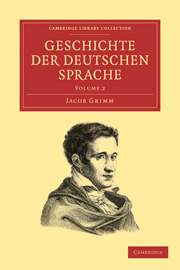Book contents
- Frontmatter
- XXI HESSEN UND BATAVEN
- XXII HERMUNDUREN
- XXIII DIE NIEDERDEUTSCHEN
- XXIV FRIESEN UND CHAUKEN
- XXV LANGOBARDEN UND BURGUNDEN
- XXVI DIE UBRIGEN OSTSTÄMME
- XXVII SCANDINAVIEN
- XXVIII DIE EDDA
- XXIX GERMANEN UND DEUTSCHE
- XXX RÜCKBLICK
- XXXI DEUTSCHE DIALECTE
- XXXII DER ABLAUT
- XXXIII DIE REDUPLICATION
- XXXIV SCHWACHE VERBA
- XXXV VERSCHOBNES PRAETERITUM
- XXXVI DIE VOCALE DER DECLINATION
- XXXVII DER INSTRUMENTALIS
- XXXVIII SCHWACHE NOMINA
- XXXIX DER DUALIS
- XL RECHT UND LINK
- XLI MILCH UND FLEISCH
- XLII SCHLUSS
- Bemerkte druckfehler, lies
- Frontmatter
- XXI HESSEN UND BATAVEN
- XXII HERMUNDUREN
- XXIII DIE NIEDERDEUTSCHEN
- XXIV FRIESEN UND CHAUKEN
- XXV LANGOBARDEN UND BURGUNDEN
- XXVI DIE UBRIGEN OSTSTÄMME
- XXVII SCANDINAVIEN
- XXVIII DIE EDDA
- XXIX GERMANEN UND DEUTSCHE
- XXX RÜCKBLICK
- XXXI DEUTSCHE DIALECTE
- XXXII DER ABLAUT
- XXXIII DIE REDUPLICATION
- XXXIV SCHWACHE VERBA
- XXXV VERSCHOBNES PRAETERITUM
- XXXVI DIE VOCALE DER DECLINATION
- XXXVII DER INSTRUMENTALIS
- XXXVIII SCHWACHE NOMINA
- XXXIX DER DUALIS
- XL RECHT UND LINK
- XLI MILCH UND FLEISCH
- XLII SCHLUSS
- Bemerkte druckfehler, lies
Summary
Es ist eine schöne in den neueren sprachen entbehrte eigenschaft der älteren, die sinnlich wahrnehmbare zweiheit durch besondere formen auszudrücken. auf die vollkommenste weise geschieht es, wenn sie zugleich am nomen und verbum hervortreten, wie in der griechischen sprache; höchst lebendig mahlt das ὄσσε ϕαεινὼ δινείσϑην II. 17, 679. τὼ δέ οἱ ὄσσε λαμπέσϑην II. 15, 607. 19,365.
Für unsre sprachgeschichte hat es nun grossen werth, dass ausser dem sanskrit und griechischen auch das litthauische und altslavische dieser beiden dualgestalten allenthalben mächtig erscheint, während sie bereits im altdeutschen aussterben, im latein beinahe, im keltischen völlig erloschen sind. allein auch die griech, duale beginnen schon sich mit pluralen zu mischen und ihnen allmälich zu weichen; im neuen testament fand Ulfilas gar kein vorbild mehr für seine goth. duale, die desto echter im goth. hafteten. die heutigen slavischen dialecte, mit einziger ausnahme des slovenischen, haben dem dual entsagt und nur einzelne überreste davon behalten; in der litthauischen mundart dauert er, in der lettischen und preussischen hat er aufgehört. Bei uns steht unter den schriftsprachen der verbaldualis bloss der gothischen zu gebot; den nominalen besitzt sie, gleich allen übrigen, weder in subst. noch adj., bloss im persönlichen pronomen; einzelne volksmundarten bewahren merkwürdige spur von beiden.
- Type
- Chapter
- Information
- Geschichte der deutschen Sprache , pp. 966 - 979Publisher: Cambridge University PressPrint publication year: 2009First published in: 1848



